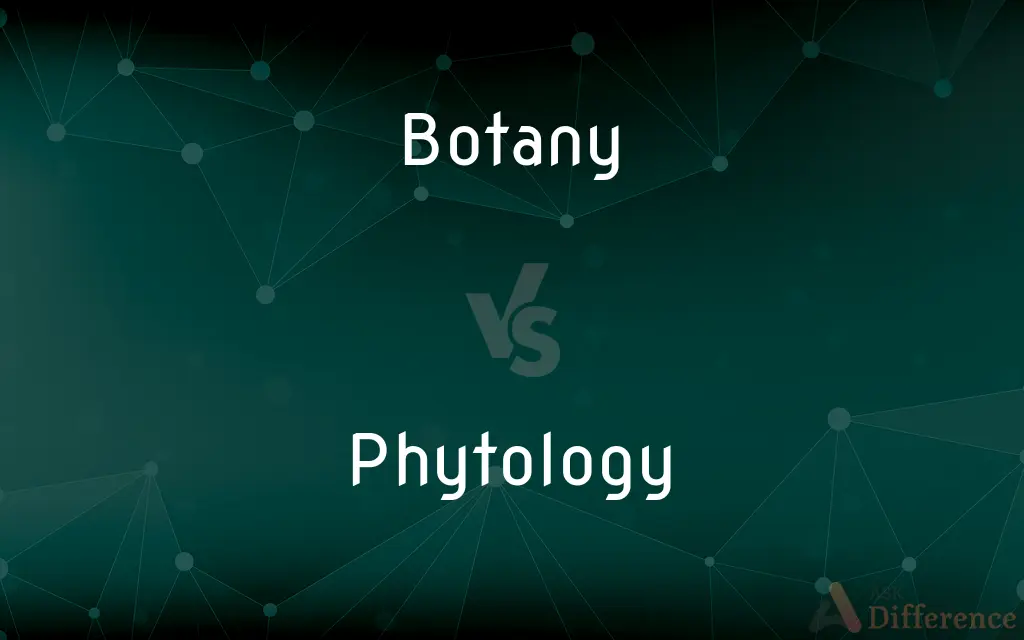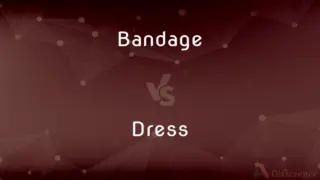Botany vs. Phytology — What's the Difference?
Edited by Tayyaba Rehman — By Fiza Rafique — Updated on March 19, 2024
Botany is the scientific study of plants, encompassing all plant life forms, whereas phytology, often used interchangeably, specifically focuses on the botanical aspects.

Difference Between Botany and Phytology
Table of Contents
ADVERTISEMENT
Key Differences
Botany is a broad field that includes the study of all types of plants, algae, and fungi, exploring their structure, growth, reproduction, metabolism, development, diseases, and chemical properties. Whereas phytology, often considered a synonym for botany, tends to focus more specifically on the study and classification of plants.
Botany not only explores the physical and biological aspects of plant life but also investigates the environmental interactions and the role of plants in ecosystems. On the other hand, phytology, while also encompassing these areas, is sometimes more narrowly applied to the study of plant physiology and the botanical classification.
In the context of academic and professional disciplines, botany encompasses a wide range of specializations such as plant pathology, plant ecology, paleobotany, and plant physiology. Phytology, while it can be considered a part of botany, is sometimes used to emphasize the study of plant biology and physiology within the botanical sciences.
Botany has a long history as a science, with contributions from ancient civilizations to modern-day research, impacting agriculture, horticulture, and environmental science. Phytology, as a term, is less commonly used but emphasizes the biological and physiological aspects of plant sciences within the broader scope of botany.
Botanists and phytologists work in similar fields, conducting research in laboratories and the field, contributing to our understanding of plant life and its impact on the world. However, botanists may engage in a broader scope of plant science, while phytologists might focus more on the specific physiological processes of plants.
ADVERTISEMENT
Comparison Chart
Definition
The scientific study of plants, including their physiology, structure, genetics, ecology, distribution, classification, and economic importance.
A branch of botany focusing specifically on the study of plants, often emphasizing plant physiology and biology.
Scope
Broad, covering all plant life forms and their roles in ecosystems.
Narrower, often focusing on plant biology and physiology.
Specializations
Includes plant pathology, ecology, paleobotany, and physiology.
More focused on physiological and biological studies within botany.
Historical Significance
Has a long history, contributing to agriculture, horticulture, and environmental science.
Less commonly used term, emphasizing the biological study of plants.
Professional Application
Botanists may work in a wide range of plant science fields.
Phytologists often specialize in physiological and biological aspects of plants.
Compare with Definitions
Botany
Affects agriculture and horticulture.
Botany research helps improve crop yields and resistance.
Phytology
.
Botany
Investigates plant-environment interactions.
Botanists study how plants adapt to different climates.
Phytology
Focus on plant biology.
Phytology delves into the biological processes of plants.
Botany
Includes various specializations.
A botanist might specialize in the study of plant diseases.
Phytology
Specialized branch of botany.
Phytology is a focused area within the broader field of plant sciences.
Botany
Involves field and laboratory work.
Botanists conduct experiments in labs and observe plants in their natural habitats
Phytology
Researches plant functions.
A phytologist examines how plants absorb nutrients from the soil.
Botany
Study of all plant life.
Botany covers everything from tiny algae to giant redwoods.
Phytology
Often synonymous with botany.
In many contexts, phytology is used interchangeably with botany.
Botany
Botany, also called plant science(s), plant biology or phytology, is the science of plant life and a branch of biology. A botanist, plant scientist or phytologist is a scientist who specialises in this field.
Phytology
Emphasizes plant physiology.
Phytologists might study how plants photosynthesize.
Botany
The science or study of plants.
Phytology
The study of plants; botany.
Botany
A book or scholarly work on this subject.
Phytology
(biology) the study of plants; botany
Botany
The plant life of a particular area
The botany of the Ohio River valley.
Phytology
The science of plants; a description of the kinds and properties of plants; botany.
Botany
The characteristic features and biology of a particular kind of plant or plant group.
Phytology
The branch of biology that studies plants
Botany
(uncountable) The scientific study of plants, a branch of biology. Typically those disciplines that involve the whole plant.
Botany
The plant life of a geographical area; flora.
The botany of Greenland
Botany
The properties and life phenomena exhibited by a plant, plant type, or plant group.
Botany
(countable) A botanical treatise or study, especially of a particular system of botany or that of a particular place.
Botany
The science which treats of the structure of plants, the functions of their parts, their places of growth, their classification, and the terms which are employed in their description and denomination. See Plant.
Botany
A book which treats of the science of botany.
Botany
The branch of biology that studies plants
Common Curiosities
What is the main difference between botany and phytology?
Botany is the broad study of plants, while phytology specifically focuses on the biological and physiological aspects of plants.
What do botanists study?
Botanists study the structure, growth, reproduction, metabolism, diseases, and environmental impact of plants.
Can phytology be considered a part of botany?
Yes, phytology is often considered a specialized branch within botany.
What might a phytologist focus on in their studies?
A phytologist focuses on the physiological processes of plants, such as photosynthesis and nutrient uptake.
What kind of environments do botanists work in?
Botanists work in a variety of environments, from laboratories and greenhouses to natural habitats and botanical gardens.
Why is the study of plants important for biodiversity?
Understanding plant life helps in the conservation of biodiversity and the maintenance of healthy ecosystems.
Is phytology a commonly used term in plant sciences?
Phytology is less commonly used than botany but is still recognized in the study of plant biology and physiology.
How does botany impact our daily lives?
Botany impacts agriculture, horticulture, environmental management, and conservation, affecting food production and ecosystem health.
What are some specializations within botany?
Specializations include plant pathology, ecology, paleobotany, and plant physiology.
Can botany help in combating climate change?
Yes, through the study of plant-environment interactions and the development of sustainable agricultural practices.
How has botany evolved over time?
Botany has evolved from herbalism and the study of medicinal plants to a comprehensive scientific discipline that includes genetic engineering and environmental conservation.
Are there careers that specifically focus on phytology?
Yes, there are careers focused on the physiological and biological aspects of plants, often in research and academia.
How do botany and phytology contribute to environmental science?
They contribute by enhancing our understanding of plant roles in ecosystems and their responses to environmental changes.
What educational background is needed to become a botanist or a phytologist?
A degree in botany, biology, or a closely related field is typically required, with further specialization for phytology.
How do botany and phytology research methods differ?
Research methods may overlap, but phytology often emphasizes laboratory-based studies of plant physiology.
Share Your Discovery

Previous Comparison
Bandage vs. Dress
Next Comparison
Shocked vs. AppalledAuthor Spotlight
Written by
Fiza RafiqueFiza Rafique is a skilled content writer at AskDifference.com, where she meticulously refines and enhances written pieces. Drawing from her vast editorial expertise, Fiza ensures clarity, accuracy, and precision in every article. Passionate about language, she continually seeks to elevate the quality of content for readers worldwide.
Edited by
Tayyaba RehmanTayyaba Rehman is a distinguished writer, currently serving as a primary contributor to askdifference.com. As a researcher in semantics and etymology, Tayyaba's passion for the complexity of languages and their distinctions has found a perfect home on the platform. Tayyaba delves into the intricacies of language, distinguishing between commonly confused words and phrases, thereby providing clarity for readers worldwide.














































